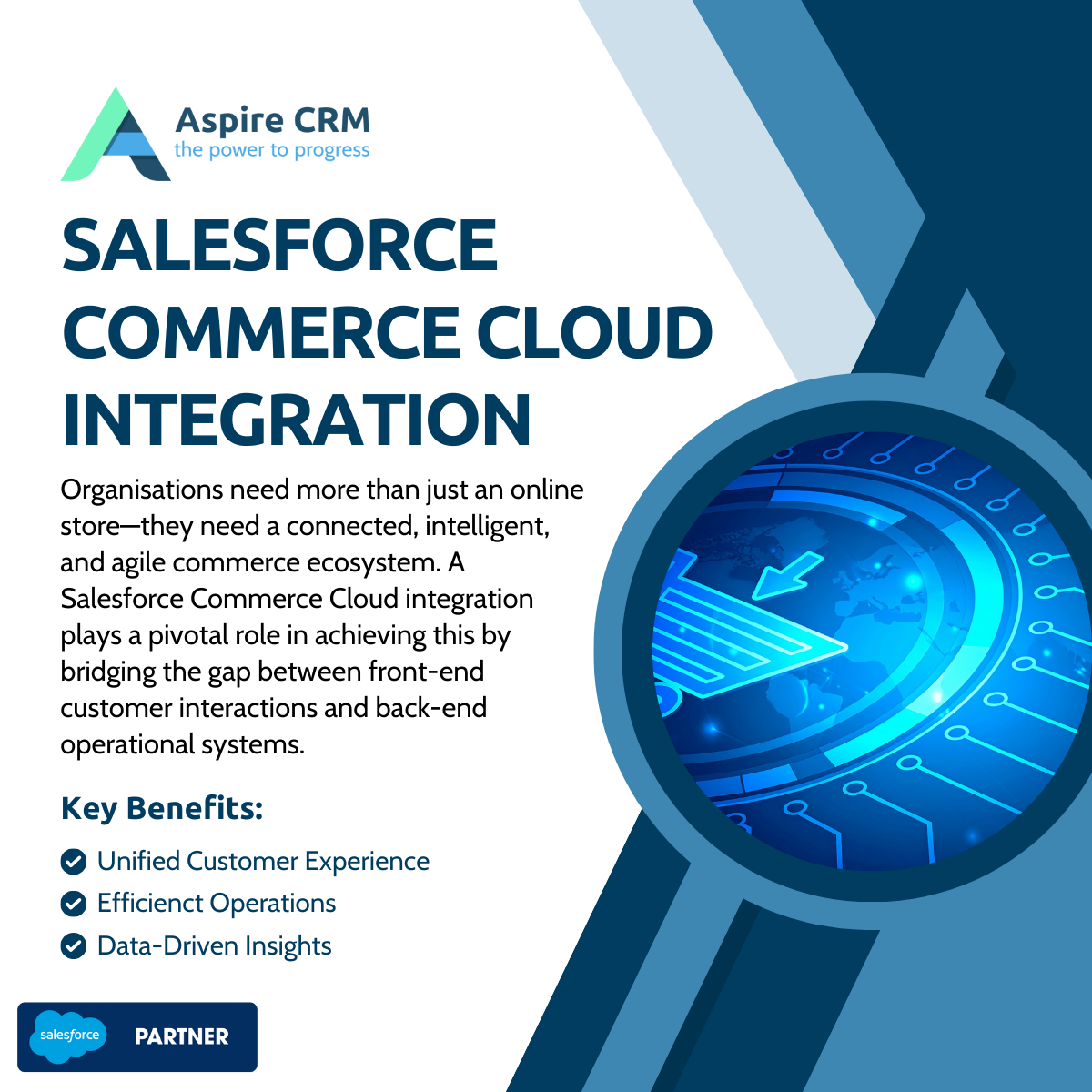
Organisations need more than just an online store—they need a connected, intelligent, and agile commerce ecosystem. A Salesforce Commerce Cloud integration plays a pivotal role in achieving this by bridging the gap between front-end customer interactions and back-end operational systems. This integration enables businesses to streamline processes, unify data, and deliver consistent, personalised experiences across all digital channels.
This article explores the essential components and benefits of a Salesforce Commerce Cloud integration, covering strategic advantages such as operational efficiency, scalability, security, and future readiness. From industry-specific use cases to emerging trends, the following sections offer a comprehensive guide for businesses looking to enhance their digital commerce capabilities.
Unified Customer Experience
Consistency across every customer touchpoint is crucial for building brand loyalty and delivering excellent service. When Salesforce Commerce Cloud is integrated within your Salesforce CRM, it ensures that each interaction is informed by a full view of the customer’s journey. This results in experiences that are seamless, relevant, and tailored to individual preferences.
By syncing customer data across all digital channels, businesses can personalise messaging, provide timely product recommendations, and resolve issues quickly. Salesforce Commerce Cloud makes it possible to unify online and offline behaviour, enabling organisations to deliver a coherent experience whether the customer is shopping on a website, mobile app, or social platform.
Operational Efficiency
Digital commerce operations rely on coordination between various systems such as inventory, order management, finance, and logistics. Without a Salesforce Commerce Cloud integration, these systems often operate in silos, leading to inefficiencies, data duplication, and human error.
The connectivity automates routine tasks, including real-time inventory updates, order confirmations, and fulfilment status notifications. As a result, businesses reduce their dependency on manual intervention, speed up order processing, and minimise delays. The outcome is a more efficient operational model that frees up resources for innovation and customer engagement.
Scalability and Flexibility
As market demands evolve, scalability becomes essential for long-term growth. A Salesforce Commerce Cloud integration allows businesses to expand their operations effortlessly—whether that means launching in new regions, introducing more product lines, or handling increased web traffic during peak seasons.
Beyond scalability, flexibility is a critical benefit. The platform’s API-first architecture makes it easy to introduce new services, applications, or third-party tools without disrupting core processes. With integrated systems in place, businesses can adapt quickly to new opportunities and challenges, ensuring they stay competitive in a fast-paced environment.
Enhanced Security and Compliance
Security and compliance are critical in the UK’s digital commerce environment, especially with the UK General Data Protection Regulation (UK GDPR) in force. A Salesforce Commerce Cloud integration supports data protection measures, including encryption, user access controls, and secure cloud infrastructure that meets national compliance standards.
By centralising data control and applying audit-friendly governance processes, businesses can more easily meet the UK GDPR’s requirements for transparency, consent management, data minimisation, and the right to erasure. Salesforce also enables region-specific data residency, allowing businesses to store and process customer data within the UK or approved jurisdictions.
Data-Driven Insights
Informed decision-making depends on having the right data at the right time. Integration ensures that sales data, customer interactions, marketing performance, and inventory trends are all captured in a unified platform. These consolidated insights can be analysed in real time to support tactical decisions and long-term strategic planning.
With a Salesforce Commerce Cloud integration, analytics and AI tools can be applied across the entire commerce ecosystem. To maximise this potential, Aspire CRM leverages AgentForce—its proprietary AI engine built to work within the Salesforce ecosystem. AgentForce analyses behaviour patterns, predicts demand, and provides intelligent recommendations, allowing UK businesses to move from reactive to proactive decision-making.
Integration with Legacy Systems
Many enterprises still operate with legacy systems that fulfil mission-critical functions. However, the age and complexity of these systems can hinder innovation. By using middleware, pre-built connectors, or custom APIs, a Salesforce Commerce Cloud integration enables organisations to link modern cloud platforms with older infrastructure.
This hybrid approach allows companies to leverage their existing technology investments while gradually transitioning to more agile and scalable environments. It also reduces the risks associated with full system overhauls, providing a more measured and manageable path to digital transformation.
Industry-Specific Integration Benefits
Each industry has distinct needs when it comes to digital commerce. In the healthcare sector, a Salesforce Commerce Cloud integration can facilitate compliance with patient data regulations while improving procurement workflows. In manufacturing, integration supports just-in-time inventory management and accurate order fulfilment.
The education sector benefits from integrated solutions that manage course enrollments, digital materials, and fee payments in a streamlined manner. By addressing industry-specific challenges with tailored integration strategies, organisations can drive efficiency, innovation, and value in ways that generic platforms cannot.
Compliance and Data Sovereignty Considerations
Global businesses must navigate complex legal environments, especially regarding how and where customer data is stored. Data sovereignty laws differ by country and region, requiring localised control over storage and access. Salesforce Commerce Cloud supports multi-region deployments that can be configured to comply with these diverse regulations.
Integration plays a key role in managing compliance by ensuring that sensitive data flows through secure, jurisdiction-compliant channels. Through Salesforce’s architecture and partner ecosystem, businesses can implement solutions that respect local regulations without sacrificing operational efficiency or user experience.
Hybrid SaaS Models in Salesforce Commerce Cloud Integration
Not every organisation is ready to fully transition to the cloud. Hybrid SaaS models combine the benefits of cloud agility with the stability of on-premise systems, offering a middle ground that many enterprises prefer. Salesforce supports this model by providing tools that connect cloud services to existing IT environments.
This structure allows for incremental adoption of cloud capabilities, making it easier to pilot new features, expand digital services, or migrate specific operations. A Salesforce Commerce Cloud integration within a hybrid model ensures businesses maintain control while gaining the scalability and resilience of the cloud.
Role of Cloud Brokers in Integration
Cloud brokers act as strategic advisors who guide businesses through the planning, implementation, and optimisation of cloud services. They evaluate business needs, identify compatible platforms, and help design integration frameworks that align with specific goals.
In the case of a Salesforce Commerce Cloud, brokers can facilitate integrations with ERP, CRM, logistics, and marketing systems. By leveraging their expertise, businesses can avoid common pitfalls, streamline project execution, and achieve faster time-to-value from their integration initiatives.
Integration Challenges and Mitigation Strategies
Integration projects often face delays or technical hiccups, from data inconsistencies to low user adoption. Thorough planning and stakeholder engagement are key to overcoming these hurdles. With careful testing and change management, these risks can be significantly reduced.
Aspire CRM offers discovery workshops, sandbox testing, and employee onboarding support to help mitigate these challenges. Their structured approach ensures your Salesforce Commerce Cloud project remains on schedule, on budget, and delivers measurable ROI.
Future Trends in Salesforce Commerce Cloud Integration
The future of eCommerce integration will be shaped by AI, predictive automation, and composable architecture. Salesforce continues to evolve in this direction, embedding intelligent features into every aspect of its platform. Salesforce AI-powered solution Agentforce enables dynamic pricing, automated service journeys, and real-time inventory optimisation—all embedded into Salesforce Commerce Cloud.
Final Thoughts
Salesforce Commerce Cloud integration is more than a technical upgrade—it’s a strategic foundation for growth, agility, and customer success. By unifying systems, enabling real-time insights, and ensuring regulatory compliance, integration helps businesses navigate the complexities of digital commerce with confidence.
Organisations that invest in seamless integration now will not only gain operational efficiencies but also unlock new opportunities for personalisation, innovation, and global expansion. The future of digital commerce belongs to those who are connected and ready.




